归纳总结have的用法
- 格式:doc
- 大小:30.50 KB
- 文档页数:4
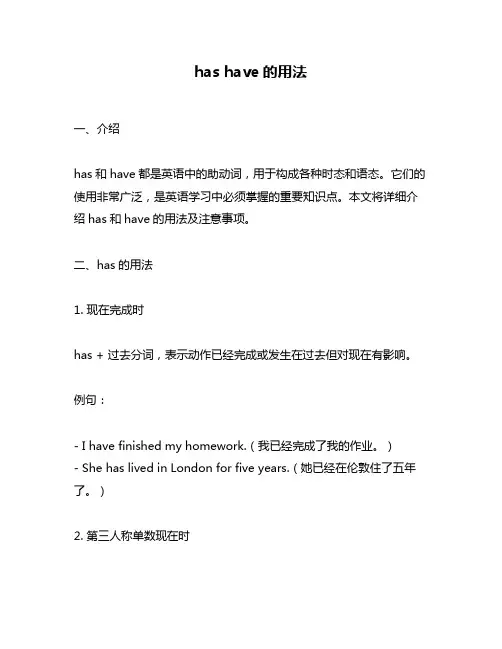
has have的用法一、介绍has和have都是英语中的助动词,用于构成各种时态和语态。
它们的使用非常广泛,是英语学习中必须掌握的重要知识点。
本文将详细介绍has和have的用法及注意事项。
二、has的用法1. 现在完成时has + 过去分词,表示动作已经完成或发生在过去但对现在有影响。
例句:- I have finished my homework.(我已经完成了我的作业。
)- She has lived in London for five years.(她已经在伦敦住了五年了。
)2. 第三人称单数现在时has + 动词原形,表示第三人称单数主语现在正在进行的动作。
例句:- He has a car.(他有一辆汽车。
)- She has a lot of friends.(她有很多朋友。
)3. 表示所有格has + 名词,表示某物属于某人或某物拥有某个特定属性。
例句:- The cat has a long tail.(这只猫有一条长尾巴。
)- My sister has beautiful hair.(我的姐姐有漂亮的头发。
)4. 表示存在has + 名词,表示某个事物存在或发生。
例句:- There has been an accident.(发生了一起事故。
)- The company has a new CEO.(这家公司有一位新的CEO。
)三、have的用法1. 现在完成时have + 过去分词,表示动作已经完成或发生在过去但对现在有影响。
例句:- I have eaten breakfast.(我吃过早饭了。
)- They have visited Paris twice.(他们已经两次去过巴黎。
)2. 现在时have + 动词原形,表示主语现在正在进行的动作。
例句:- We have lunch at noon.(我们中午吃午饭。
)- They have a meeting every Monday.(他们每周一开会。
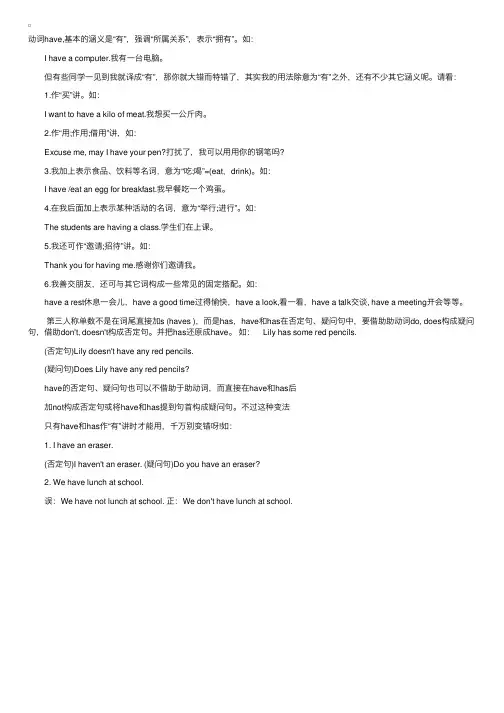
动词have,基本的涵义是“有”,强调“所属关系”,表⽰“拥有”。
如: I have a computer.我有⼀台电脑。
但有些同学⼀见到我就译成“有”,那你就⼤错⽽特错了,其实我的⽤法除意为“有”之外,还有不少其它涵义呢。
请看: 1.作“买”讲。
如: I want to have a kilo of meat.我想买⼀公⽄⾁。
2.作“⽤;作⽤;借⽤”讲,如: Excuse me, may I have your pen?打扰了,我可以⽤⽤你的钢笔吗? 3.我加上表⽰⾷品、饮料等名词,意为“吃;喝”=(eat,drink)。
如: I have /eat an egg for breakfast.我早餐吃⼀个鸡蛋。
4.在我后⾯加上表⽰某种活动的名词,意为“举⾏;进⾏”。
如: The students are having a class.学⽣们在上课。
5.我还可作“邀请;招待”讲。
如: Thank you for having me.感谢你们邀请我。
6.我善交朋友,还可与其它词构成⼀些常见的固定搭配。
如: have a rest休息⼀会⼉,have a good time过得愉快,have a look,看⼀看,have a talk交谈, have a meeting开会等等。
第三⼈称单数不是在词尾直接加s (haves ),⽽是has,have和has在否定句、疑问句中,要借助助动词do, does构成疑问句,借助don't, doesn't构成否定句。
并把has还原成have。
如: Lily has some red pencils. (否定句)Lily doesn't have any red pencils. (疑问句)Does Lily have any red pencils? have的否定句、疑问句也可以不借助于助动词,⽽直接在have和has后 加not构成否定句或将have和has提到句⾸构成疑问句。
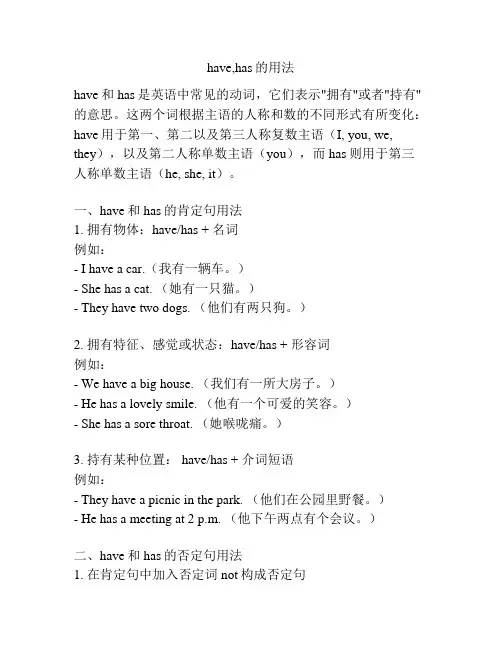
have,has的用法have和has是英语中常见的动词,它们表示"拥有"或者"持有"的意思。
这两个词根据主语的人称和数的不同形式有所变化:have用于第一、第二以及第三人称复数主语(I, you, we, they),以及第二人称单数主语(you),而has则用于第三人称单数主语(he, she, it)。
一、have和has的肯定句用法1. 拥有物体:have/has + 名词例如:- I have a car.(我有一辆车。
)- She has a cat. (她有一只猫。
)- They have two dogs. (他们有两只狗。
)2. 拥有特征、感觉或状态:have/has + 形容词例如:- We have a big house. (我们有一所大房子。
)- He has a lovely smile. (他有一个可爱的笑容。
)- She has a sore throat. (她喉咙痛。
)3. 持有某种位置: have/has + 介词短语例如:- They have a picnic in the park. (他们在公园里野餐。
)- He has a meeting at 2 p.m. (他下午两点有个会议。
)二、have和has的否定句用法1. 在肯定句中加入否定词not构成否定句例如:- I do not have a car. (我没有汽车。
)- She does not have a cat. (她没有猫。
)- They do not have two dogs. (他们没有两只狗。
)2. 在肯定句的缩略形式中,常用haven't 和 hasn't例如:- I haven't seen him today. (我今天还没见到他。
)- She hasn't finished her homework. (她还没有做完作业。
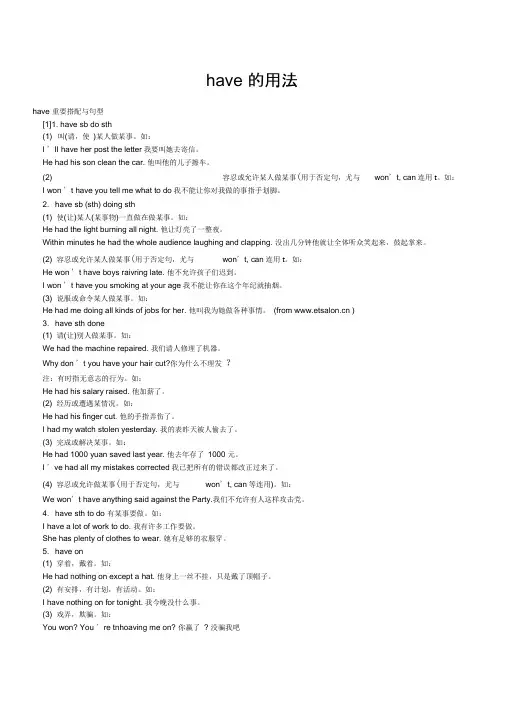
have 的用法have 重要搭配与句型[1] 1. have sb do sth(1) 叫(请,使)某人做某事。
如:I ' II have her post the letter我要叫她去寄信。
He had his son clean the car. 他叫他的儿子擦车。
(2) 容忍或允许某人做某事(用于否定句,尤与won' t, can连用t。
如:I won ' t have you tell me what to do我不能让你对我做的事指手划脚。
2. have sb (sth) doing sth(1) 使(让)某人(某事物)一直做在做某事。
如:He had the light burning all night. 他让灯亮了一整夜。
Within minutes he had the whole audience laughing and clapping. 没出几分钟他就让全体听众笑起来,鼓起掌来。
(2) 容忍或允许某人做某事(用于否定句,尤与won' t, can连用t。
如:He won ' t have boys raivring late. 他不允许孩子们迟到。
I won ' t have you smoking at your age我不能让你在这个年纪就抽烟。
(3) 说服或命令某人做某事。
如:He had me doing all kinds of jobs for her. 他叫我为她做各种事情。
(from )3. have sth done(1) 请(让)别人做某事。
如:We had the machine repaired. 我们请人修理了机器。
Why don ' t you have your hair cut?你为什么不理发?注:有时指无意志的行为。
如:He had his salary raised. 他加薪了。
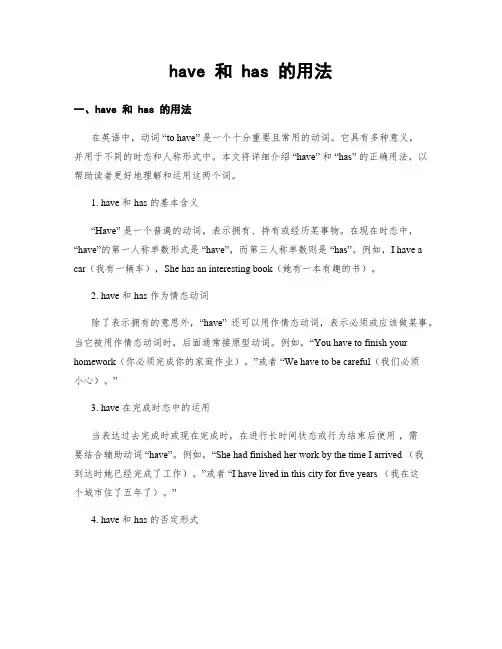
have 和 has 的用法一、have 和 has 的用法在英语中,动词“to have” 是一个十分重要且常用的动词。
它具有多种意义,并用于不同的时态和人称形式中。
本文将详细介绍“have” 和“has” 的正确用法,以帮助读者更好地理解和运用这两个词。
1. have 和 has 的基本含义“Have” 是一个普遍的动词,表示拥有、持有或经历某事物。
在现在时态中,“have”的第一人称单数形式是“have”,而第三人称单数则是“has”。
例如,I have a car(我有一辆车),She has an interesting book(她有一本有趣的书)。
2. have 和 has 作为情态动词除了表示拥有的意思外,“have” 还可以用作情态动词,表示必须或应该做某事。
当它被用作情态动词时,后面通常接原型动词。
例如,“You have to finish your homework(你必须完成你的家庭作业)。
”或者“We have to be careful(我们必须小心)。
”3. have 在完成时态中的运用当表达过去完成时或现在完成时,在进行长时间状态或行为结束后使用,需要结合辅助动词“have”。
例如,“She had finished her work by the time I arrived (我到达时她已经完成了工作)。
”或者“I have lived in this city for five years (我在这个城市住了五年了)。
”4. have 和 has 的否定形式当我们要表达否定的意思时,可以使用“don't have” 或“doesn't have”,具体取决于人称和时态。
例如,“I don't have a cat (我没有猫)。
”和“He doesn't have time to go shopping(他没时间去购物)。
”5. have 和 has 的使用场景除了表示拥有之外,have 还可表示其他不同的意义,如:- 表示进食或饮用:“I usually have breakfast at 7 am(我通常七点吃早餐)。
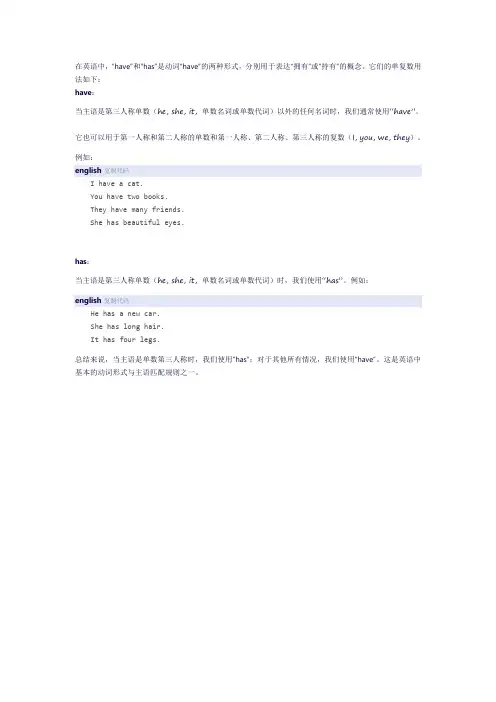
在英语中,“have”和“has”是动词“have”的两种形式,分别用于表达“拥有”或“持有”的概念。
它们的单复数用法如下:
have:
当主语是第三人称单数(he, she, it, 单数名词或单数代词)以外的任何名词时,我们通常使用“have”。
它也可以用于第一人称和第二人称的单数和第一人称、第二人称、第三人称的复数(I, you, we, they)。
例如:
english复制代码
I have a cat.
You have two books.
They have many friends.
She has beautiful eyes.
has:
当主语是第三人称单数(he, she, it, 单数名词或单数代词)时,我们使用“has”。
例如:
english复制代码
He has a new car.
She has long hair.
It has four legs.
总结来说,当主语是单数第三人称时,我们使用“has”;对于其他所有情况,我们使用“have”。
这是英语中基本的动词形式与主语匹配规则之一。
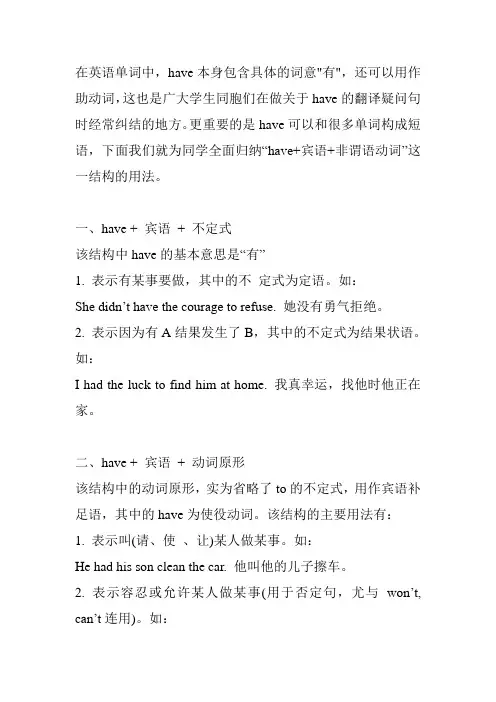
在英语单词中,have本身包含具体的词意"有",还可以用作助动词,这也是广大学生同胞们在做关于have的翻译疑问句时经常纠结的地方。
更重要的是have可以和很多单词构成短语,下面我们就为同学全面归纳“have+宾语+非谓语动词”这一结构的用法。
一、have + 宾语+ 不定式该结构中have的基本意思是“有”1. 表示有某事要做,其中的不定式为定语。
如:She didn’t have the courage to refuse. 她没有勇气拒绝。
2. 表示因为有A结果发生了B,其中的不定式为结果状语。
如:I had the luck to find him at home. 我真幸运,找他时他正在家。
二、have + 宾语+ 动词原形该结构中的动词原形,实为省略了to的不定式,用作宾语补足语,其中的have为使役动词。
该结构的主要用法有:1. 表示叫(请、使、让)某人做某事。
如:He had his son clean the car. 他叫他的儿子擦车。
2. 表示容忍或允许某人做某事(用于否定句,尤与won’t, can’t连用)。
如:I won’t have you tell me what to do. 我不能让你对我做的事指手划脚。
三、have + 宾语+ 现在分词该结构中的现在分词用作宾语补足语,其中的have为使役动词。
该结构的主要用法有:1. 表示使(让)某人(某事物)一直做在做某事或处于做某事的状态之中。
如:She had her audience listening attentively. 她使听众听得入神。
2. 表示容忍或允许某人做某事(用于否定句,尤与won’t, can’t连用)。
如:I won’t have you smoki ng at your age. 我不能让你在这个年纪就抽烟。
3. 说服或命令某人做某事。
如:He had me doing all kinds of jobs for her. 他叫我为她做各种事情。
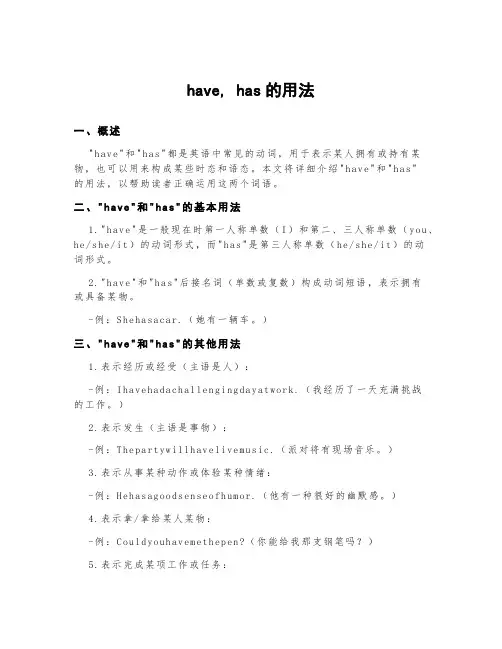
have, has的用法一、概述"h av e"和"ha s"都是英语中常见的动词,用于表示某人拥有或持有某物,也可以用来构成某些时态和语态。
本文将详细介绍"h av e"和"h as"的用法,以帮助读者正确运用这两个词语。
二、"h a v e"和"has"的基本用法1."h av e"是一般现在时第一人称单数(I)和第二、三人称单数(y ou、h e/s he/i t)的动词形式,而"h as"是第三人称单数(he/s he/it)的动词形式。
2."h av e"和"ha s"后接名词(单数或复数)构成动词短语,表示拥有或具备某物。
-例:S he ha sa ca r.(她有一辆车。
)三、"h a v e"和"has"的其他用法1.表示经历或经受(主语是人):-例:I ha ve ha da cha l le ng in gd ay at wor k.(我经历了一天充满挑战的工作。
)2.表示发生(主语是事物):-例:T he pa rt yw ill h av el iv em us ic.(派对将有现场音乐。
)3.表示从事某种动作或体验某种情绪:-例:H eh as ag oo dse n se of hu mo r.(他有一种很好的幽默感。
)4.表示拿/拿给某人某物:-例:C ou ld yo uh ave m et he pe n?(你能给我那支钢笔吗?)5.表示完成某项工作或任务:-例:S he ha sf in ish e dh er ho me wo rk.(她已完成了作业。
)四、"h a v e"和"has"的不定式用法1."h av et o"后接动词原形,表示必须做某事:-例:I ha ve to go tot h ed en ti st to mo rro w.(我明天必须去看牙医。
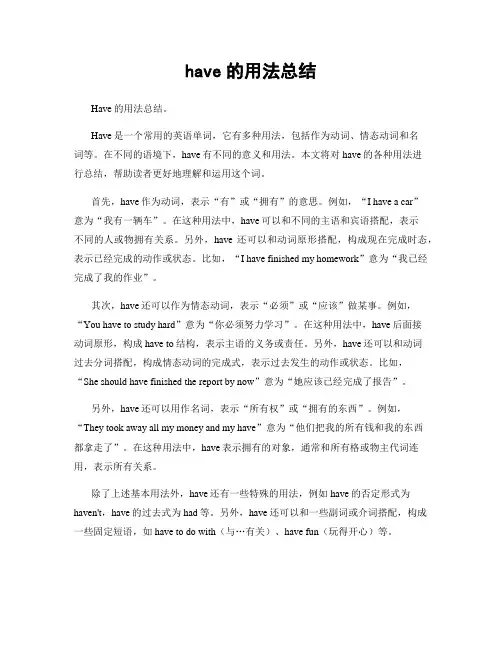
have的用法总结Have的用法总结。
Have是一个常用的英语单词,它有多种用法,包括作为动词、情态动词和名词等。
在不同的语境下,have有不同的意义和用法。
本文将对have的各种用法进行总结,帮助读者更好地理解和运用这个词。
首先,have作为动词,表示“有”或“拥有”的意思。
例如,“I have a car”意为“我有一辆车”。
在这种用法中,have可以和不同的主语和宾语搭配,表示不同的人或物拥有关系。
另外,have还可以和动词原形搭配,构成现在完成时态,表示已经完成的动作或状态。
比如,“I have finished my homework”意为“我已经完成了我的作业”。
其次,have还可以作为情态动词,表示“必须”或“应该”做某事。
例如,“You have to study hard”意为“你必须努力学习”。
在这种用法中,have后面接动词原形,构成have to结构,表示主语的义务或责任。
另外,have还可以和动词过去分词搭配,构成情态动词的完成式,表示过去发生的动作或状态。
比如,“She should have finished the report by now”意为“她应该已经完成了报告”。
另外,have还可以用作名词,表示“所有权”或“拥有的东西”。
例如,“They took away all my money and my have”意为“他们把我的所有钱和我的东西都拿走了”。
在这种用法中,have表示拥有的对象,通常和所有格或物主代词连用,表示所有关系。
除了上述基本用法外,have还有一些特殊的用法,例如have的否定形式为haven't,have的过去式为had等。
另外,have还可以和一些副词或介词搭配,构成一些固定短语,如have to do with(与…有关)、have fun(玩得开心)等。
总之,have是一个非常常用的词汇,在英语中有着多种用法。
通过本文的总结,相信读者对have的用法有了更清晰的认识,能够更加准确地运用这个词汇,提高语言表达的准确性和流畅度。
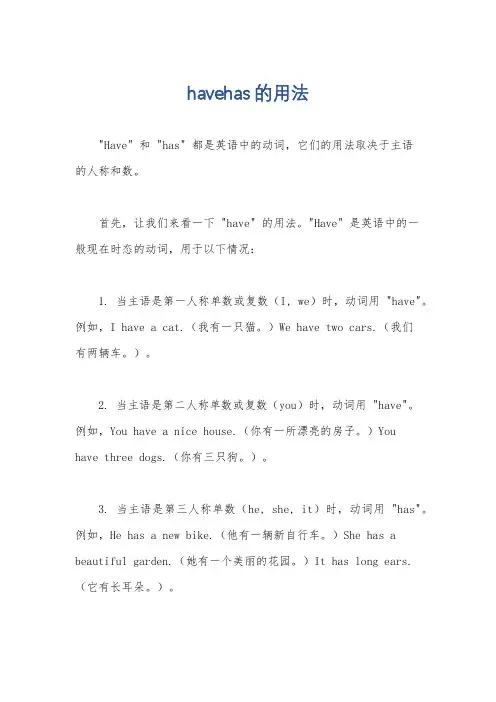
havehas的用法"Have" 和 "has" 都是英语中的动词,它们的用法取决于主语的人称和数。
首先,让我们来看一下 "have" 的用法。
"Have" 是英语中的一般现在时态的动词,用于以下情况:1. 当主语是第一人称单数或复数(I, we)时,动词用 "have"。
例如,I have a cat.(我有一只猫。
)We have two cars.(我们有两辆车。
)。
2. 当主语是第二人称单数或复数(you)时,动词用 "have"。
例如,You have a nice house.(你有一所漂亮的房子。
)Youhave three dogs.(你有三只狗。
)。
3. 当主语是第三人称单数(he, she, it)时,动词用 "has"。
例如,He has a new bike.(他有一辆新自行车。
)She has a beautiful garden.(她有一个美丽的花园。
)It has long ears.(它有长耳朵。
)。
总结来说,"have" 用于第一人称和第二人称以及第三人称复数,而 "has" 用于第三人称单数。
除了上述的主要用法外,"have" 还可以用作情态动词,表示义务、必要性或推测。
例如,I have to finish my homework.(我必须完成我的作业。
)She might have gone to the store.(她可能去了商店。
)。
希望以上解释能够帮助你理解 "have" 和 "has" 的用法。
如果你还有其他问题,欢迎继续提问。
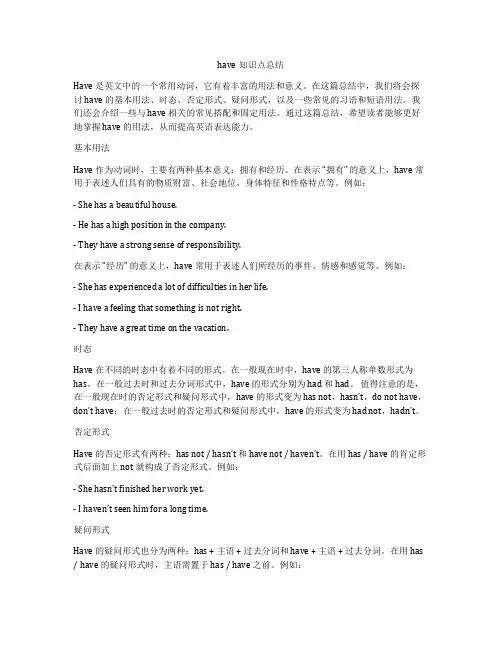
have知识点总结Have 是英文中的一个常用动词,它有着丰富的用法和意义。
在这篇总结中,我们将会探讨 have 的基本用法、时态、否定形式、疑问形式,以及一些常见的习语和短语用法。
我们还会介绍一些与 have 相关的常见搭配和固定用法。
通过这篇总结,希望读者能够更好地掌握 have 的用法,从而提高英语表达能力。
基本用法Have 作为动词时,主要有两种基本意义:拥有和经历。
在表示“拥有” 的意义上,have 常用于表述人们具有的物质财富、社会地位、身体特征和性格特点等。
例如:- She has a beautiful house.- He has a high position in the company.- They have a strong sense of responsibility.在表示“经历” 的意义上,have 常用于表述人们所经历的事件、情感和感觉等。
例如:- She has experienced a lot of difficulties in her life.- I have a feeling that something is not right.- They have a great time on the vacation.时态Have 在不同的时态中有着不同的形式。
在一般现在时中,have 的第三人称单数形式为has。
在一般过去时和过去分词形式中,have 的形式分别为 had 和 had。
值得注意的是,在一般现在时的否定形式和疑问形式中,have 的形式变为 has not,hasn’t,do not have,don’t have;在一般过去时的否定形式和疑问形式中,have 的形式变为 had not,hadn’t。
否定形式Have 的否定形式有两种:has not / hasn’t 和have not / haven’t。
在用 has / have 的肯定形式后面加上 not 就构成了否定形式。
have和been的用法一、认识动词“have”和“been”动词“have”和“been”是英语中常用的两个动词,具有不同的语法功能和用法。
本文将深入探讨这两个动词的基本用法以及常见的相关表达方式,帮助读者更好地理解和运用它们。
二、“have”的基本用法1. “Have”作为实义动词表示拥有或持有某物:- I have a car.(我有一辆车。
)- She has a beautiful house.(她有一幢漂亮的房子。
)2. “Have”表示经历或参与某种活动:- We had a great time at the party last night.(我们昨晚在派对上玩得很开心。
) - He had surgery last week.(他上周做了手术。
)3. “Have”用于表示感官体验或情绪状态:- I am having a headache.(我头疼。
)- They have fun at the amusement park.(他们在游乐园玩得很开心。
)4. “Have”可作为助动词构成完成时态:- She has finished her homework.(她已经完成了她的家庭作业。
)- Have you ever been to Paris?(你去过巴黎吗?)5. “Have”还可以表示需要、必须或应该:- You have to be careful when driving.(开车时你必须小心。
)- We have to finish the project by Friday.(我们必须在星期五之前完成这个项目。
)三、“been”的基本用法1. “Been”作为“be”的过去分词,表示主语经历过某种状态或行为:- I have been to Japan twice.(我去过日本两次。
)- She has been studying English for five years.(她已经学英语五年了。
高考常用词have用法总结一have搭配的短语归纳1have a rest\break 2have a good\hard time 3have a seat\test\an accident 4have a word\talk with 5 have a ccess to 6have an effect on7have an advantage over\of 8 have fun 9have an intersted in 10have a relation to 11have a taste for 12 have no idea of13have an ear\eye\attraction for 14have faith in 15have nothing on 16 have something\nothing\a lot to do with 17have^^ in common18 have the right to do something 19have respect for 20have skill in 二have常考句型1have a hard\good time in doing somethingHaving been ill in bed for a month,he had a hard time pssing the exam. 2have trouble\difficulty in doing somethingI have no trouble in finding his house.3have no choice but to do somethingI have no choice but to saty here.4have got=have I have got a pen.=I have a pen.5have been to 曾经去过,人已经回来了have gone to已经去了某地,人还未回来I have been to beijing,but I am back in shantou now.He has gone to beijing,he is not in shantou now,6have a better understanding of something 精通某事,技能He has a better understanding of English.。
have和has的用法和例句一、have和has的基本用法在英语中,动词“have”常用于描述拥有、持有或具备某种东西的情况。
根据主语的不同形式,其时态也会发生变化。
例如,当主语为第一人称单数(I)或第二人称(you)时,动词“have”的现在时态形式为“have”,而当主语为第三人称单数(he/she/it)时,则需要使用其专属的形式“has”。
二、现在时态下的例句1. I have a car.我有辆汽车。
2. She has a beautiful house.她有一座漂亮的房子。
3. They have two dogs and three cats.他们有两只狗和三只猫。
4. He has a job interview tomorrow.他明天要参加工作面试。
5. We have English class every Monday.我们每周星期一都上英语课。
三、过去时态下的例句1. I had a great time at the party last night.昨晚我在派对上玩得很开心。
2. She had lunch with her friends yesterday.昨天她和朋友们一起吃了午餐。
3. They had a long discussion before making a decision.他们在做出决定之前进行了长时间的讨论。
4. He had visited Paris twice before he turned 20.他在20岁以前已经两次去过巴黎。
5. We had a lot of fun during our vacation.我们度假期间玩得很开心。
四、将来时态下的例句1. I will have dinner with my family tonight.今晚我将和家人一起吃晚餐。
2. She will have a meeting tomorrow morning.明天早上她有一个会议。
have sth done的用法归纳"Have sth done" 是一个使役动词短语,表示让别人为自己做某事。
它的基本结构是"have + 宾语+ 过去分词"。
下面是该用法的一些归纳:1. 表示雇佣或委托:主语是动作的发起者,将指定的任务交由他人完成。
- I had my car repaired by a mechanic. (我让一位汽车技师修理了我的车辆。
)- She had her hair cut at the salon. (她在沙龙理发了。
)2. 表示请求或要求:主语请求或命令别人完成某事。
- We had the documents translated into English. (我们要求将这些文件翻译成英文。
)- He had his assistant organize the meeting. (他让助手组织了会议。
)3. 表示安排或计划:主语安排或计划让别人去做某事。
- They had a new website designed for their company. (他们安排设计一个新的公司网站。
)- The company had the building renovated. (公司安排了对建筑进行翻新。
)4. 表示自愿或意外的结果:主语经历或发生了某种情况或事件。
- I had my phone stolen on the train. (我的手机在火车上被偷了。
)- She had her wallet lost while shopping. (她在购物时把钱包丢了。
)需要注意的是,"have sth done" 结构中,过去分词表示的是完成动作的结果或状态,并且通常强调动作的完成,而不是动作本身的进行。
have 和has的用法“have” 和“has” 的用法主要有以下几种情况:1. 主语是第一人称、第二人称或第三人称复数时,使用“have”:I have a book.You have a pencil.They have a car.2. 主语是第三人称单数时,使用“has”:He has a book.She has a pencil.It has a tail.3. 与所有格代词连用时:His has a name tag.(这里应为“He has”,因为“His”指的是男性,而“has”是第三人称单数形式)Her has a bracelet.(这里应为“She has”,因为“Her”指的是女性)4. 在被动语态中使用:The book has been read by many people.5. 固定短语:have to - 表示必须或被迫做某事。
have a look - 表示看一看。
have a rest - 表示休息一下。
6. 完成时的助动词:在完成时态中,“have”作为助动词与过去分词连用,表示某个动作或状态已经完成。
例如:I have finished my homework.(我已经完成了作业。
)7. 虚拟语气中的用法:在虚拟语气中,“have”可以表示与现在事实相反的情况,如“If I had time, I would go out for a walk.”(如果我有时问,我就会出去散步。
)8. 与其他词的搭配:have可以与许多其他词搭配使用,例如“have a good time”、“have a drink”、“have a meeting”等。
总结来说,“have”和“has”的主要区别在于主语是单数还是复数。
当主语是第三人称单数时,使用“has”;当主语是第一人称、第二人称或第三人称复数时,使用“have”。
归纳总结have的用法
I.作"有"讲,表示"所属的有"。如:
①I have forty paper stars.我有四十个纸星星。
②She has fifty pictures.她有五十张图片。
II.作"吃、喝"讲。如:
①I have breakfast at home.我在家吃早饭。
②I would like to have a glass of water.我想喝杯水。
III.作"借用"讲。如:
May I have your bike? 我可以用一下你的自行车吗?
IV.作"招待"讲。如:
Thank you for having me.谢谢你招待我。
另外,have还可以与其它词构成一些固定搭配。如:
1)have a look看一看
2)have classes上课
3)have a rest休息一会儿
4)have a good time玩得高兴
have常用短语:
1、have a look 看一看
Let me have a look at your photo.
2、Have lunch/breakfast/supper 吃中(早、晚)饭
We often have lunch in the school.
3、have one's meal(s) 吃饭
Where will we go to have our meals?
4、have a swim 游泳
It's very hot. Let's go to have a swim in the river.
5、have classes/lessons 上课
Stop talking. Let's have our lessons/classes.
6、have a lot of homework to do 有大量的作业要做
I will have a lot of homework to do this evening.
7、have a good time 玩得高兴
Did you have a good time in the winter holiday?
8、have a drink 喝饮料(酒)
Let's go to the bar and have a drink.
9、have a meeting 开会
When will we have a meeting?
10、have a rest. 休息一会儿
You're too tired and you must have a rest.
11、had better (not) do sth. 最好(不)做某事
You'd better go to the town today.
12、have to do sth. 不得做某事
It's very far away and I have to take a taxi.
13、have been to a place 去过某地
Have you ever been to Beijing?
14、have gone to a place 去某地了
My father isn't at home and he has gone to Shanghai.
15、have a wash 洗脸
The little boy didn't have a wash this morning.
16、have a test 进行测验(考试)
Let's have a test, class.
17、have (got) a headache 头痛
I've got a headache, doctor.
18、have a cough 咳嗽
How long have you had a cough, young man?
19、have a cold 患感冒
Li Wei had a bad cold yesterday and he didn't come to school.
20、Have sports 进行体育活动
When do you usually have sports in the afternoon?